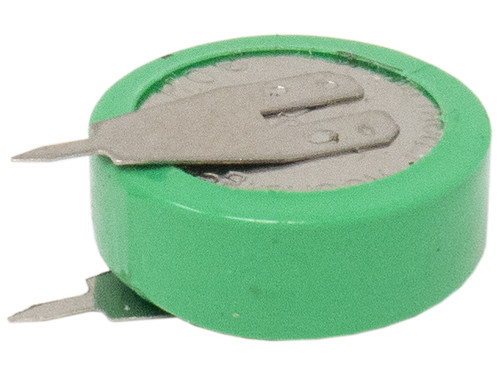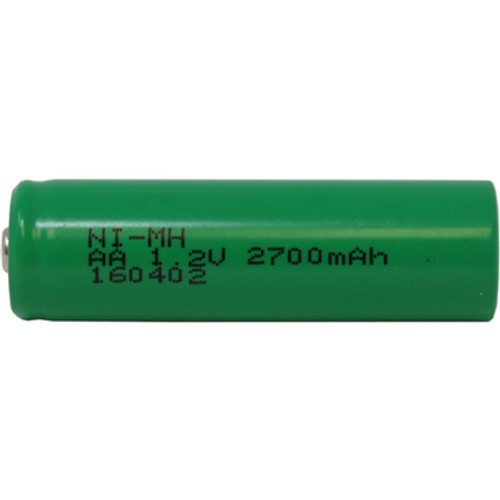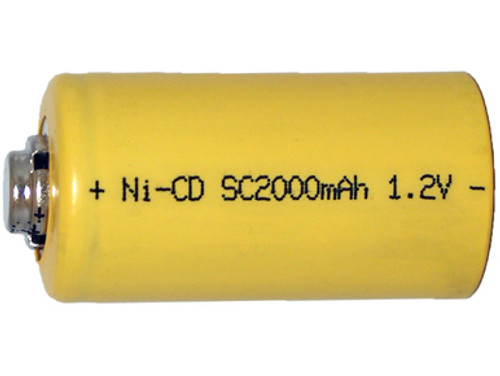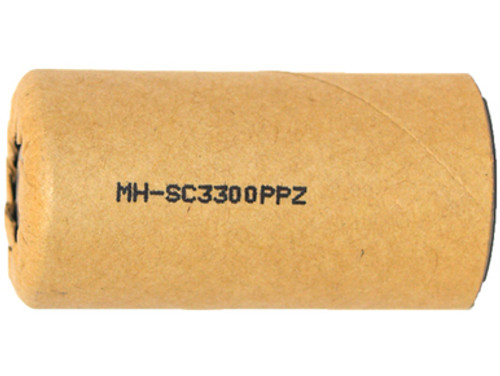
-

-

AA NiMH Battery (2700 mAh)
$6.99As low as:- Buy in bulk and save
Bulk discount rates
Below are the available bulk discount rates for each individual item when you purchase a certain amount
- Buy 2 - 12 and pay only $6.99 each
- Buy 13 - 25 and pay only $6.29 each
- Buy 26 - 50 and pay only $6.09 each
- Buy 51 or above and pay only $6.09 each
-

C NiCd Battery (3500 mAh) - Flat Top
$6.99As low as:- Buy in bulk and save
Bulk discount rates
Below are the available bulk discount rates for each individual item when you purchase a certain amount
- Buy 2 - 12 and pay only $6.99 each
- Buy 13 - 30 and pay only $6.59 each
- Buy 31 - 50 and pay only $6.49 each
- Buy 51 - 200 and pay only $6.19 each
- Buy 201 or above and pay only $6.19 each
-

A NiMH Flat Top Battery (2700 mAh)
$7.19As low as:- Buy in bulk and save
Bulk discount rates
Below are the available bulk discount rates for each individual item when you purchase a certain amount
- Buy 2 - 11 and pay only $7.19 each
- Buy 12 - 29 and pay only $6.89 each
- Buy 30 - 49 and pay only $6.59 each
- Buy 50 - 196 and pay only $6.49 each
- Buy 197 or above and pay only $6.49 each
-

-

4/5 Sub C NiMH Battery (2000 mAh)
$7.29As low as:- Buy in bulk and save
Bulk discount rates
Below are the available bulk discount rates for each individual item when you purchase a certain amount
- Buy 2 - 8 and pay only $7.29 each
- Buy 9 - 14 and pay only $7.19 each
- Buy 15 - 24 and pay only $6.99 each
- Buy 25 - 38 and pay only $6.89 each
- Buy 39 - 77 and pay only $6.59 each
- Buy 78 or above and pay only $6.59 each
-

1/3 AAA 150 mAh Button Top NiMH Battery (For Solar Lights)
$7.49As low as:- Buy in bulk and save
Bulk discount rates
Below are the available bulk discount rates for each individual item when you purchase a certain amount
- Buy 2 - 6 and pay only $7.49 each
- Buy 7 - 10 and pay only $7.49 each
- Buy 11 - 27 and pay only $7.29 each
- Buy 28 - 45 and pay only $6.59 each
- Buy 46 - 136 and pay only $6.19 each
- Buy 137 or above and pay only $6.19 each
-

-

4/3 A NiMH Flat Top Battery (3800 mAh)
$7.69As low as:- Buy in bulk and save
Bulk discount rates
Below are the available bulk discount rates for each individual item when you purchase a certain amount
- Buy 2 - 10 and pay only $7.69 each
- Buy 11 - 27 and pay only $7.49 each
- Buy 28 - 45 and pay only $7.19 each
- Buy 46 - 182 and pay only $6.89 each
- Buy 183 or above and pay only $6.89 each
-

-

230H 1.2 Volt NiMH Button Battery
$7.99As low as:- Buy in bulk and save
Bulk discount rates
Below are the available bulk discount rates for each individual item when you purchase a certain amount
- Buy 2 - 7 and pay only $7.99 each
- Buy 8 - 33 and pay only $6.89 each
- Buy 34 - 94 and pay only $6.49 each
- Buy 95 or above and pay only $6.49 each
-

80H 1.2V 80mAh NiMH Button Battery
$7.99As low as:- Buy in bulk and save
Bulk discount rates
Below are the available bulk discount rates for each individual item when you purchase a certain amount
- Buy 2 - 9 and pay only $7.99 each
- Buy 10 - 37 and pay only $6.59 each
- Buy 38 - 99 and pay only $5.79 each
- Buy 100 or above and pay only $5.79 each
-

Sub C NiCd Button Top Battery (2000 mAh)
$7.99As low as:- Buy in bulk and save
Bulk discount rates
Below are the available bulk discount rates for each individual item when you purchase a certain amount
- Buy 2 - 7 and pay only $7.99 each
- Buy 8 - 13 and pay only $7.89 each
- Buy 14 - 21 and pay only $7.69 each
- Buy 22 - 35 and pay only $7.49 each
- Buy 36 - 70 and pay only $7.29 each
- Buy 71 or above and pay only $7.29 each
-

2/3 A Elite NiMH 1500mAh Battery
$8.19As low as:- Buy in bulk and save
Bulk discount rates
Below are the available bulk discount rates for each individual item when you purchase a certain amount
- Buy 2 - 16 and pay only $8.19 each
- Buy 17 - 41 and pay only $7.89 each
- Buy 42 - 69 and pay only $7.69 each
- Buy 70 - 278 and pay only $7.59 each
- Buy 279 or above and pay only $7.59 each
-

-

Sub C NiMH Battery (3300 mAh)
$8.29As low as:- Buy in bulk and save
Bulk discount rates
Below are the available bulk discount rates for each individual item when you purchase a certain amount
- Buy 2 - 7 and pay only $8.29 each
- Buy 8 - 13 and pay only $7.89 each
- Buy 14 - 21 and pay only $7.69 each
- Buy 22 - 35 and pay only $7.49 each
- Buy 36 - 70 and pay only $7.29 each
- Buy 71 or above and pay only $7.29 each
-

Sub C NiMH Paper Wrapped Battery (3300 mAh)
$8.29As low as:- Buy in bulk and save
Bulk discount rates
Below are the available bulk discount rates for each individual item when you purchase a certain amount
- Buy 2 - 8 and pay only $8.29 each
- Buy 9 - 13 and pay only $7.59 each
- Buy 14 - 22 and pay only $7.49 each
- Buy 23 - 36 and pay only $7.29 each
- Buy 37 - 72 and pay only $6.99 each
- Buy 73 or above and pay only $6.99 each
-

-

4/3 A NiMH Battery with Tabs (3800 mAh)
$8.39As low as:- Buy in bulk and save
Bulk discount rates
Below are the available bulk discount rates for each individual item when you purchase a certain amount
- Buy 2 - 8 and pay only $8.39 each
- Buy 9 - 25 and pay only $7.99 each
- Buy 26 - 41 and pay only $7.89 each
- Buy 42 - 83 and pay only $7.59 each
- Buy 84 - 166 and pay only $7.19 each
- Buy 167 or above and pay only $7.19 each
-

1.2 Volt Batteries: Understanding NiMH and NiCd Rechargeable Options
Rechargeable batteries with a nominal voltage of 1.2 volts have become an increasingly popular power source for a wide range of electronic devices. Their cost-effectiveness, reusability, and environmental sustainability make them an attractive choice for consumers and professionals alike. Among the most commonly used 1.2-volt rechargeable batteries are NiMH (Nickel-Metal Hydride) and NiCd (Nickel-Cadmium) batteries.
Both battery types share some similarities, such as long lifespans, the ability to be recharged hundreds of times, and compatibility with numerous devices. However, they also have distinct differences that make each better suited to specific applications.
NiMH Batteries: A Modern, High-Capacity Solution
NiMH batteries are a newer and improved version of NiCd batteries, offering several advantages that have contributed to their growing popularity. These batteries are widely used in devices that require significant power and long runtime, such as:
Digital cameras
Remote controls
Toys
Flashlights
Cordless phones
Key Advantages of NiMH Batteries
Higher Capacity:
NiMH batteries can store more energy than NiCd batteries of the same size, providing longer usage times between charges.
Ideal for devices with high power demands.
Low Self-Discharge Rate:
NiMH batteries retain their charge for longer when not in use compared to NiCd batteries.
This makes them suitable for devices used intermittently, such as cameras or emergency equipment.
No Memory Effect:
Unlike NiCd batteries, NiMH batteries do not lose their capacity when recharged without being fully discharged.
This allows users to recharge the battery at any time without degrading its performance.
Eco-Friendly:
NiMH batteries are less toxic than NiCd batteries, making them more environmentally friendly.
Many countries have recycling programs specifically for NiMH batteries to further reduce their environmental impact.
Variety of Sizes:
Available in standard sizes such as AA, AAA, C, D, as well as specialized sizes like 2/3 A, 2/3 AA, sub-C, and A.
Their versatility allows them to be used in a wide range of devices.
Applications of NiMH Batteries
High-Drain Devices: Ideal for devices like digital cameras and flashlights that require extended run times.
Everyday Electronics: Commonly used in remote controls, toys, and cordless phones due to their reliability.
Eco-Friendly Solutions: Perfect for environmentally conscious users seeking reusable alternatives to disposable batteries.
NiCd Batteries: Reliable and Fast-Charging
NiCd batteries were once the most widely used rechargeable batteries due to their reliability and durability. While they have been largely replaced by NiMH batteries in many applications, NiCd batteries are still favored for specific use cases.
Key Advantages of NiCd Batteries
Fast Charging Times:
NiCd batteries charge faster than NiMH batteries, making them ideal for situations where quick recharges are necessary.
Long Lifespan:
These batteries can withstand more charge and discharge cycles than NiMH batteries, making them suitable for devices with frequent power demands.
Durability:
NiCd batteries are known for their ruggedness and ability to perform well under extreme conditions.
Limitations of NiCd Batteries
Lower Capacity:
NiCd batteries store less energy than NiMH batteries of the same size, resulting in shorter run times.
Memory Effect:
NiCd batteries suffer from the memory effect, meaning they must be fully discharged before recharging to maintain their capacity.
Failure to do so can result in reduced battery life and performance over time.
Environmental Concerns:
NiCd batteries contain toxic cadmium, which poses environmental risks if not properly recycled.
Due to these concerns, many regions have implemented strict disposal regulations for NiCd batteries.
Applications of NiCd Batteries
Industrial Tools: Commonly used in power tools and emergency equipment where fast recharging is critical.
Extreme Environments: Preferred for devices used in harsh conditions, as they are less affected by temperature fluctuations.
High-Cycle Applications: Suitable for applications requiring frequent charge and discharge cycles, such as medical devices and two-way radios.
Choosing the Right Battery for Your Application
When deciding between NiMH and NiCd batteries, consider the specific requirements of your device and usage patterns:
Choose NiMH Batteries If:
Your device requires high power and long runtime (e.g., digital cameras, toys, flashlights).
You prefer an environmentally friendly option with no memory effect.
You want a rechargeable battery with a lower self-discharge rate for intermittent use.
Choose NiCd Batteries If:
Your device requires fast recharging (e.g., power tools, emergency equipment).
Your application involves frequent charge/discharge cycles.
You need a rugged battery for use in extreme conditions.
Best Practices for Using and Maintaining 1.2 Volt Batteries
To maximize the lifespan and performance of your 1.2-volt rechargeable batteries, follow these tips:
Use the Correct Charger:
Always use a charger designed for your battery type (NiMH or NiCd) to prevent damage or reduced performance.
Avoid Overcharging:
Remove batteries from the charger once fully charged to prevent overheating and degradation.
Store Properly:
Store batteries in a cool, dry place when not in use to reduce self-discharge and extend shelf life.
Recycle Responsibly:
Dispose of old or damaged batteries at designated recycling centers to minimize environmental impact.
1.2-volt rechargeable batteries, particularly NiMH and NiCd, are a reliable and sustainable power solution for a variety of electronic devices. While NiMH batteries excel in capacity, environmental impact, and versatility, NiCd batteries remain a durable choice for specific high-cycle or fast-charging applications.
By understanding the unique strengths of each type, you can choose the battery that best meets your device’s requirements and usage patterns. Whether you prioritize runtime, rechargeability, or durability, both NiMH and NiCd batteries offer excellent performance for powering modern technology.





